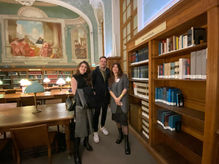(IN)ERRANCE IV
November 12 – December 18, 2024
Sorbonne Art Gallery
Paris , France
As part of the collective exhibition “(IN)ERRANCE IV”, hosted at the Interuniversity Library of the Sorbonne and curated by Yann Toma, young artist-researchers from the International Research Master in Arts & Vision (MAVI, Université Paris 1 Panthéon-Sorbonne) presented works engaging with the notions of wandering and displacement. These concepts were explored not only as spatial and physical experiences but also as artistic and intellectual processes, revealing the poetic force of instability and the creative potential of ongoing research.
Within this framework, Deniz Demirer presented three bodies of work that reflect on women’s experiences, collective creativity, and the struggle against gender-based violence.
Her installation “Les Femmes qui m’inspirent” (2024) is an ode to female creativity and the power of collective art. This collaborative project brings together women around the intimate gesture of breast casting, with each participant intervening artistically on her own cast. The resulting sculptures embody a dialogue between practices, blending vulnerability and strength, while celebrating sisterhood, diversity, and shared artistic expression.
The series “Témoignages” (2024) is inspired by the book Şiddete karşı anlattılar – Ayakta kalma ve dayanışma deneyimleri (They told their stories against violence – Experiences of survival and solidarity), published by Mor Çatı Women’s Shelter Foundation. Through installations of objects inscribed with testimonies, Demirer gives voice to women’s lived experiences of violence and resistance. By presenting these phrases in Turkish alongside translations, the series both respects the authenticity of the women’s words and makes them accessible to a wider audience, underscoring the importance of memory, solidarity, and social change.
Finally, “Vulvas” (2022–2025) consists of burned plaster casts of vulvas, confronting the trauma of sexual violence. The burn marks stand as traces of both physical and emotional pain, while the installation draws attention to the often silenced issue of sexual abuse and the enduring impact it has on survivors. The work calls for greater awareness, support, and collective responsibility in addressing sexual violence.
Through these series, Demirer positions art as a space for testimony, solidarity, and transformation—foregrounding women’s voices and experiences while engaging with broader questions of resilience and collective memory.








































